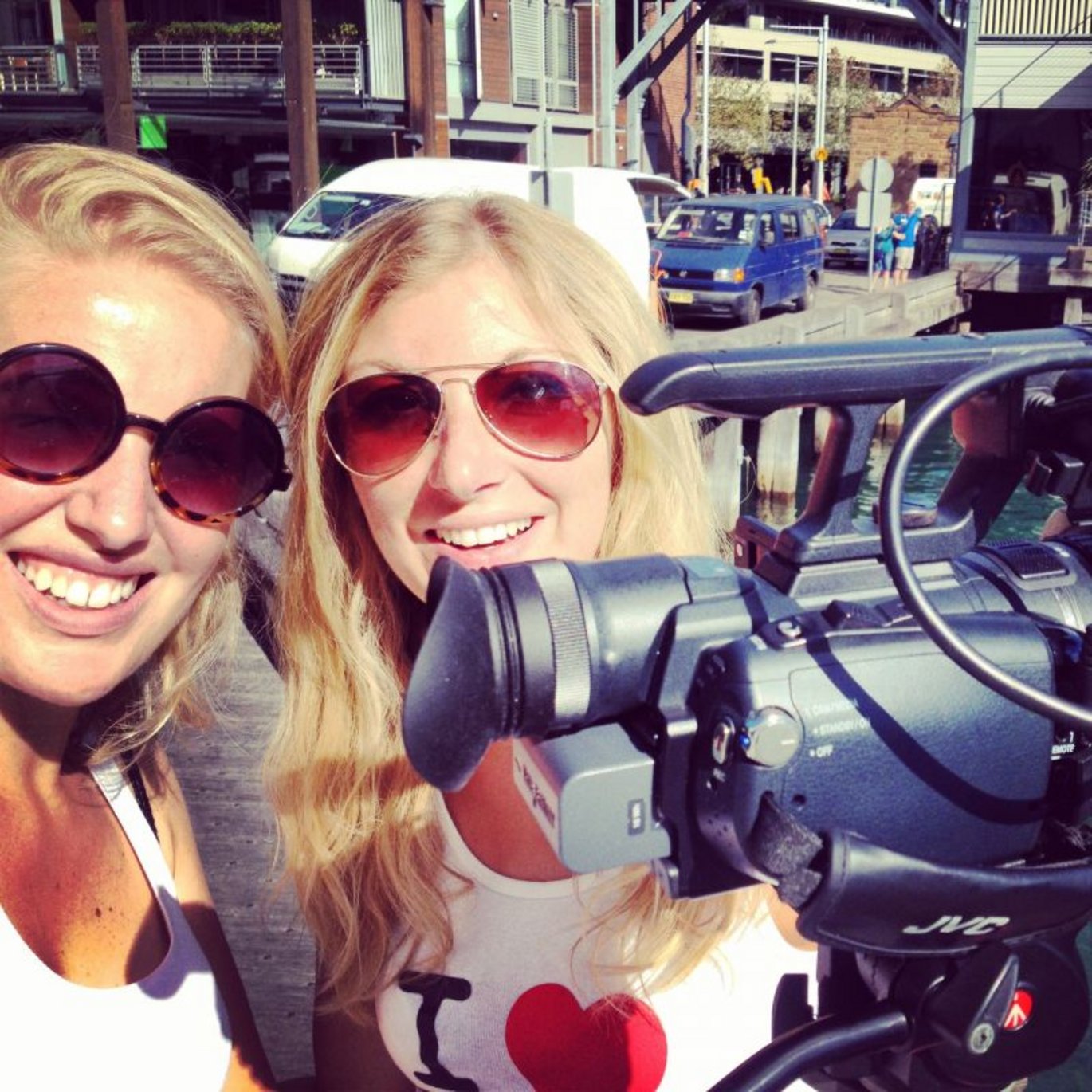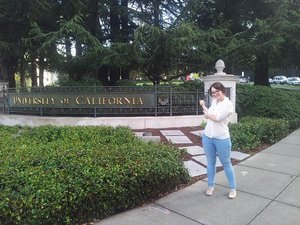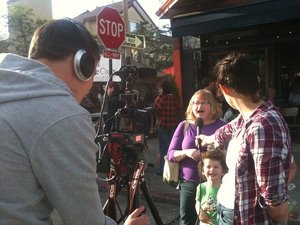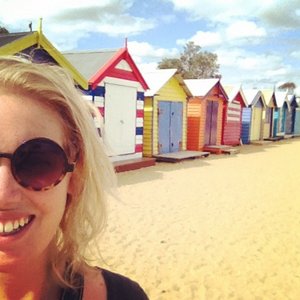Exploring journalism and study culture abroad
Each year, several students have the opportunity to take their second semester abroad. Having already traveled to Aarhus for the first semester, and being signed up for one of the specialisations already, attending this third university makes for a truly global master’s programme experience.

In either Santiago, Chile; Berkeley, USA; or Sydney, Australia; students are immersed in a study and life culture that’s as varied as the journalism courses offered at each institute. Armed with three months of academic insight into global media systems, international relations, and globalisation processes from their studies in Aarhus, the semester abroad offers the chance to take this knowledge and get a more hands-on journalism education experience in a foreign country.
With the exchanges wrapping up at the moment, we’ve asked the current students to give us a snapshot of their experiences studying and living abroad at a third Mundus Journalism partner university.
Viktorija, 28, from Lithuania, has been to Berkeley and will return to specialise in Multimedia Business Reporting at City University, London. Luis, 23, from Guatemala, has been to Santiago and will also return to England in Autumn for the Multimedia Business Reporting specialisation. And Victorine, 26, from The Netherlands, has been to Sydney and will return to Hamburg for the Journalism and Media Across Cultures Specialisation.
 Mundus Journalism: What is your favourite memory from your exchange so far? And what's the best part about being an exchange student?
Mundus Journalism: What is your favourite memory from your exchange so far? And what's the best part about being an exchange student?
Viktorija: Sitting in a class with at least 800 students and realising it's so silent, because every one of them is listening to Robert Reich with his/her mouth open. Experiencing the power of teaching, when a professor makes you understand that the subject he's teaching is his true passion and the inequalities he's talking about are personally hurting him. Feeling inspired to change the world. Best part about being an exchange student? Everyone finds my Lithuanian accent cute.
Luis: Hard one. Here's a very meta example: In one of my courses I chose to do a long journalistic piece on migrations to Chile, and found myself having to go out and visit the immigrants in their gathering places. One of those was a church, where after Sunday mass, people from different countries take turns to prepare dance and music shows, traditional foods and just be a community. Whereas I never felt quite a part of this foreign group of people, being a foreigner myself, I was at the same time the journalist/observer and a subject of the observation taking place. It was a nice time to look back and think of the whole adventure of studying this course and taking the exchange program to Chile.
Victorine: Favourite memory: My trip to Melbourne and the Great Ocean Road with three other Mundus students! Driving around in our rented car, exploring so many beautiful places, singing and dancing in the car, it was a great experience! Best part about being an exchange student: The teachers here are really interested in the Mundus-program and they are always open to our stories and experiences from abroad. The same applies to our fellow Aussie students.
MJ: How has coming from a programme made up of 50 different nationalities impacted on your interactions and studies during your exchange?
Viktorija: Coming from a programme made up of so many different nationalities made me more open and flexible to different viewpoints on various issues, as well as working style, which is extremely important working in teams. It has shown that I have a lot of knowledge on what's happening in Europe or what is the European journalism tradition/style of reporting/ethical issues that European journalists face, as well as some political and economic issues of the old continent. This kind of context would not have been possible, if I have not learned it from my classmates from 48 different countries
Luis: I guess it both prepared me to face the perils of travelling, moving to a new town, being fearless in exploring the city and its people and facing the academics, while also being the source of unchecked expectations. The cultures and universities in exchange programs cannot be fairly compared to the place you're coming from, and specially given that I was the only Mundus Student that went to Chile, I particularly had that discontinuity as a challenge.
Victorine: We arrived here with six Mundus students and we are quite close, so in class we always sit together. I don't think the multicultural program sets us apart from the other students, but you just need to make sure to be open to the other students and don't stick together too much. But the Aussies are really friendly and open people, so it is not hard to make friends with the
MJ: Are the local politics and social discussions in your exchange country influencing your areas of (study) interest?
Viktorija: In a way. Since I am going to be specializing in business and finance reporting at City University of London, I was very glad to attend a class by Robert Reich, a former Secretary of Labour, on wealth and poverty in America. This was not a class about financial journalism, but since I was always interested in the issues of inequality, it served as a very good crash course on why there are such sharp economic disparities among American people and how poverty affects social life and visa versa. The context I have acquired, I believe, will encourage me to go deeper into the topic at City University of London and examine similar processes in Europe in greater detail.
Luis: Not the areas of study I like and focus on, politics and economics, but the focus through which it's studied. I had different courses throwing different angles of research on similar topics, while also requiring me to catch up with my fellow students in the knowledge of local politics and social movements.
Victorine: Australia is a very different country politically and socially, because it really is a world on its own and the effects of this certainly interest me. But I don't think it has an influence on my areas of study interest.
 MJ: How has the Erasmus Mundus programme prepared you for this exchange? What’s been the biggest difference on the exchange from studying in Aarhus?
MJ: How has the Erasmus Mundus programme prepared you for this exchange? What’s been the biggest difference on the exchange from studying in Aarhus?
Viktorija: Erasmus Mundus programme showed the knowledge gaps I had, therefore, in Berkeley I could concentrate on filling the gaps in (for example, with Reporting Public Health and Medicine reporting class), as well as expanding my horizons and discovering new topics I could be interested in (with Following the Food Chain and Edible Education classes of the best selling New York Times author Michael Pollan).
The biggest difference from Aarhus, however, was the teaching style. UC Berkeley Graduate School of Journalism is a very small school - a true small family. Maybe because of this, or maybe because of the political traditions in the US, the teachers both at J School, as well as the university as a whole openly demonstrate their political viewpoints. They also openly share their passions and talk about things in politics, economics or social life that hurt them personally. It makes the classes more interesting, the discussions - sharper and more lively. It's not something that is common in European Universities, where the teacher keeps this mask of objectivity.
Luis: All of it. From housing and the university logistics and handlings to the culture, and daily things like making friends and going out with them, Chile and Denmark are worlds apart. That being said, they're both different in what the learning-in-a-place experience can teach you. The biggest difference, though, has been the social dynamics in Aarhus, where everyone was new and has a common programme to share, whereas in Chile I was incorporated into different student groups in each of my 5 courses (that makes me a single exchange student in 5 different bonded groups, a challenge in itself).
Victorine: The programme in Aarhus is a lot different then the program here in Sydney. The biggest difference is that right here we are mainly focusing on the practical side of journalism - writing stories, making video reports and reporting for radio. Whereas in Aarhus we had academic courses, with lots of studying.
MJ: How are you finding the living costs and social opportunities where you are? (Are you sneaking in a lot of travel?)
Viktorija: The living costs are definitely very high. San Francisco and, therefore, the whole Bay area is one of the most expensive cities in the U.S. The majority of costs come from crazy (and I mean - crazy) housing market - this is where the biggest chunk of my budget went to. Public transportation - BART - is also not cheap. But prices of food, leisure activities (pools, gyms, movies, pool/bowling) are student friendly. Sightseeing, especially around San Francisco, is worth doing and can be done cheaply, so I definitely cannot complain about social opportunities.
Luis: Chile is expensive for a Latin American country, but not so much as Denmark. There is a premium that a lot of foreigners pay due to elevated costs of rent and places that foreigners usually go to, but after a while I moved to a more suitable and affordable shared-apartment and discovered the city more intimately to salvage that. I have not travelled so much due to two reasons: one, I managed to land a part-time job, and two, tickets are not as affordable as in Europe. That being said, I did sneak some travel before getting the job offer and plan to do so before I leave the country.
Victorine: Be prepared if you get selected for the exchange to Sydney, this city is crazy expensive! But it is all worth it. And if you manage to find a job, you'll find that the salary matches your expenses. During the course we made some small trips, like going to Melbourne and visiting all the beautiful beaches Sydney has to offer, but after finishing up, me and another Mundus student will travel for at least six weeks in Australia and I will also go to New Zealand for two weeks, most of it covered by my job here.
MJ: How well do you think the semester abroad is preparing you to come back to Europe for your specialisation year?
Viktorija: I feel stronger and more professional as a journalist. Also, being around truly intelligent and dedicated young journalists at UC Berkeley, I feel inspired to become an even better journalist. The subjects I chose to study at UC Berkeley were very new to me, there were a lot of instances when I had to step out of my comfort zone and challenge myself. I am ready for more of such experience at City University of London, where I'll dive into a subject I know nothing about - business and finance
Luis: I'm particularly thankful for one of the courses that provided me with very common-sense, yet specialised tools for journalism based in data and long-haul research. I also found that a seminar on journalistic ethics was very illuminating in allowing me to engage with the dilemmas in a way that proved to be comparative, as I both learned about the European culture, the Chilean one and shared the Guatemalan experience I had encountered previously. Other courses were a bit distant from the specialism year topics, but shared some good points too.
Victorine: In contrast to Hamburg, the course is very practical in Sydney. I think it prepares you for life after studying, when you actually try to find a job and you have some great stories in your portfolio you can show!